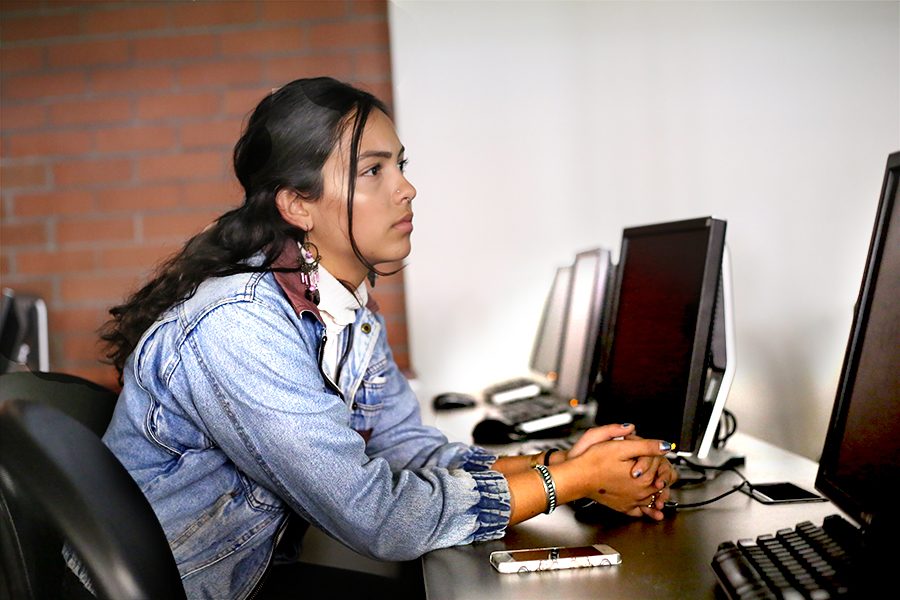Film festival highlights determination, spunk
Business major Julissa Martin watches the film “So Your Going Crazy” during the mental health workshop (event) in room LLRC-107 in in the Library Resource Center on Tuesday . The film focused on taboos of mental health in society and stressed that things can get better for those suffering from mental illness and that help is available.
Oct 26, 2017
The annual Disability Awareness Film Series at Contra Costa College aims to increase understanding of those of who are “differently-abled” and reduce some of the common social pitfalls.
Films will be hosted throughout the month of October in LLRC- 107.
The first film of the series “What do you see when you see a blind person?” goes through a number instances during an encounter between a blind person and a per- son who is not.
Such concepts as using the hours of the clock around a table setting to tell a blind person where their drink is placed at the table or being careful to guide a blind person properly as you step back when opening a door that swings outward.
These things make sense when you see them in practice but may not be familiar to everyone.
The film also covers a number of social missteps that often occur in the interactions between the visually impaired and those with full sight. The film illustrates examples like speaking loudly to “accommodate” someone who is blind or stumbling over commonly used phrases like “It’s nice to see you.”
The film suggests that people do not need to “tip-toe” around issues of disability because a per- son with a disability will deal with these issues every day — even though they may seem uncommon to others.
Chris Lucero is a communications major at CCC and he is also blind.
“People have run up to me to warn me about stairs that I am still a good distance away from, suggesting I take the elevator. If I get the chance, I try to explain to them that I walk up and down the stairs every day,” he said.
One of the central points of the film is that people with disabilities are often independent and while, at times, assistance from others is appreciated, it is important to ask clearly if someone needs help.
The film states that it is important to ask how to be of assistance. As in many social situations, communication is key to avoid misunderstandings.
“I have worked hard to be as independent as I am today. It’s something I‘m proud of,” Lucero said.
When Lucero was learning to be independent, the unneeded aid used to bother him.
“It can be hard to feel confident in yourself when people are always trying to help or assuming that you cannot do something,” he said.
“Now, I know I can get around to do the things I need to do so it doesn’t bother me as much any- more. However, I do want to tell people that we are not as helpless as we may seem.”
Instructors from CCC choose the films shown in the series and then they facilitate a conversation afterward so students and faculty in attendance can discuss the concepts and relate them to firsthand experiences.
Andrew Kuo, library department chairperson selected the opening film of the series because the information in the movie was helpful to him in the Library.
“You want to be able to treat people in a way that does not put their disability out front and you also need to know how to help if necessary,” Kuo said.
The library organizes the film series but it was originally created by Disabled Students’ Programs and Services.
Library Coordinator Megan Kinney coordinates the film series. “The films and discussions pro- vide an opportunity to share the things you already do to make all students feel more comfortable and learn about new ideas from other
students or faculty,” Kinney said. The next film titled “Autism in America” will be shown today from 3-4:45 p.m. It will explore the stories of people with autism and the issues they face.
The last two films of the series are “Service: When Women Come Marching Home” and “Lives Worth Living.”
One is about the experiences of women suffering from PTSD as a result of their military service and the other is about Fred Fay, a disabled man who spent his life advocating for programs allowing the disabled to live independently.
“Service: When Women Come Marching Home” will be hosted on Oct. 24 from 3:15-4:30 p.m. in LLRC-107.
The final film, “Lives Worth Living,” will be presented on Oct. 26 from 12:30-2 p.m. to close out the series.


